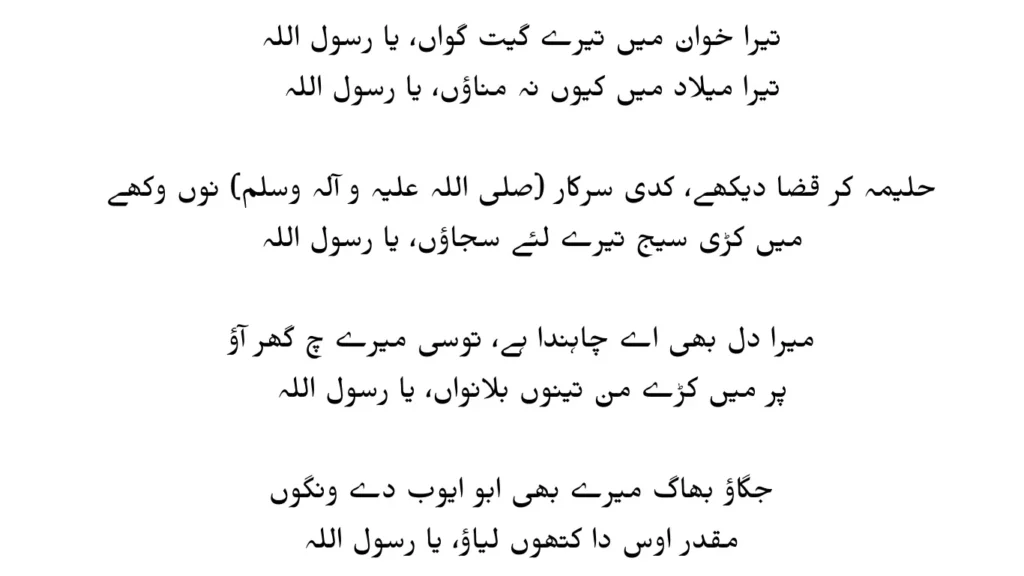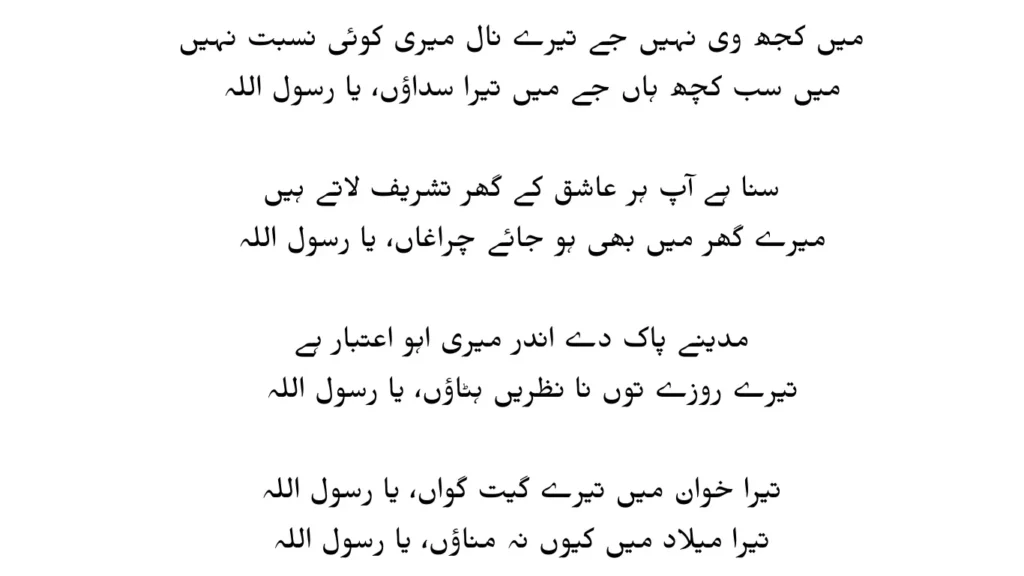Islamic poetry has long served as a heartfelt medium for expressing love and devotion toward the beloved Prophet Muhammad (ﷺ). The lyrics of Tera Khawan Mein Tere Geet Gawan Ya Rasool Allah beautifully encapsulate this sentiment. In this article, we will analyze each verse of this profound naat, exploring its meaning, spiritual significance, and emotional depth. This lyrical masterpiece invites us to celebrate the blessings of the Prophet (ﷺ) and to connect with his remembrance.
| Naat Bulalo Phir Mujhe ey shahe bahrobar Lyrics |
| Ya Nabi Nazre Karam Farmana Lyrics in Urdu |
| Lamyati Nazeero Kafi Nazarin Naat Lyrics |
| Allah Ho Allah Ho Lyrics | Malik ul mulk |
Verse 1: Tera Khawan Mein Tere Geet Gawan, Ya Rasool Allah
Translation:
“In Your court, I sing Your praises, O Messenger of Allah.”
Reflection:
This opening line sets the tone for the naat, emphasizing the devotee’s heartfelt desire to glorify the Prophet Muhammad (ﷺ). The phrase “Tera Khawan” refers to being in the presence of the Prophet, metaphorically or spiritually, where the devotee expresses unwavering love and reverence through songs of praise.
Verse 2: Tera Milad Mein Kyun Na Manawon, Ya Rasool Allah
Translation:
“Why should I not celebrate Your birth, O Messenger of Allah?”
Reflection:
The question posed in this verse highlights the joy and gratitude felt by Muslims worldwide during Milad-un-Nabi, the celebration of the Prophet’s birth. It symbolizes the believer’s acknowledgment of the Prophet’s unparalleled blessings and guidance for humanity.
Verse 3: Halima Kar Qaza Dekhay, Kadi Sarkar (ﷺ) Nu Wakhay
Translation:
“Halima (RA) experienced blessings by seeing the Prophet (ﷺ).”
Reflection:
This verse recalls the blessed foster mother of the Prophet, Halima Saadia (RA), whose life transformed after taking the Prophet Muhammad (ﷺ) into her care. It symbolizes how those who are connected to the Prophet are showered with blessings.
Verse 4: Mera Dil Bhi Ae Chaanda Hai, Tusi Mere Ch Ghar Awo
Translation:
“My heart wishes that You would visit my home too.”
Reflection:
Here, the devotee expresses a longing for the spiritual presence of the Prophet in their life. This verse highlights humility, love, and the hope for the Prophet’s blessings to illuminate one’s home.
Verse 5: Jagaon Bhag Mere Bhi Abu Ayyub De Wangan
Translation:
“Grant me fortune like Abu Ayyub Ansari’s.”
Reflection:
This verse references the great companion Abu Ayyub Ansari (RA), whose home was honored by hosting the Prophet Muhammad (ﷺ) during his migration to Madinah. It conveys the devotee’s wish for similar fortune and blessings.
Verse 6: Main Kujh Vi Nahin Je Tere Nal Meri Koi Nisbat Nahin
Translation:
“I am nothing without my connection to You.”
Reflection:
The verse signifies ultimate humility, acknowledging that the believer’s true identity and worth are derived from their association with the Prophet Muhammad (ﷺ).
Verse 7: Madinah Pak De Andar Meri Eho Aitbaar Hai
Translation:
“In Madinah, my only belief is in staying connected to You.”
Reflection:
This verse conveys the unparalleled peace and faith experienced in the holy city of Madinah, where the presence of the Prophet’s blessed mosque reinforces devotion.


FAQs:
This phrase means “In Your court, I sing Your praises, O Messenger of Allah.” It reflects the poet’s devotion and love for the Prophet Muhammad (ﷺ).
Celebrating Milad-un-Nabi symbolizes gratitude and joy for the birth of the Prophet Muhammad (ﷺ), who brought guidance and mercy to humanity.
Abu Ayyub Ansari (RA) hosted the Prophet (ﷺ) in his home during the migration to Madinah. This symbolizes the ultimate honor and blessings for a believer.
Conclusion
The naat “Tera Khawan Mein Tere Geet Gawan Ya Rasool Allah” is a lyrical journey of devotion, gratitude, and humility. Each verse carries profound spiritual lessons, connecting the listener to the Prophet Muhammad (ﷺ) through love and reverence. This poetic expression reminds believers to celebrate the blessings of the Prophet’s presence in their lives and strive for a closer connection to him.




